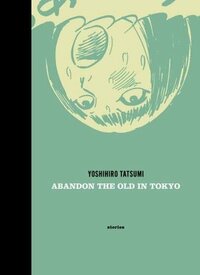Take a photo of a barcode or cover
Prior to borrowing 'Abandon the old in Tokyo' from the library, I was completely unfamiliar with comic artist Yoshihiro Tatsumi. the interior description of this collection of stories really got me though. Introduction by author Koji Suzuki (of Ring trilogy fame) spoke in short depth about the importance and strength of nostalgia, and how nostalgia is commonly viewed as only positive. Instead he poses that a darker nostalgia is present here, that remembering details and smells that result in an unfavorable, yet still welcome memory is more powerful (my inference).
Unfortunately, I have no experience living with an elder whom I would consider leaving to die secretly in the city as a way to escape. Other stories equally left me astounded, setting my nostalgia point to NOW as this book I will now compare many newer works against going forward.
Highlights of stories:
- A man abandons his elderly mother so he can live his own life.
- A window washer watches his daughter have a torrid affair in the building he cleans.
- An out of work animator finds inspiriarion drawing pornography on bathroom walls.
- A man in a pit has his fate decided by two women wronged, one physically, one emotionally.
Surprisingly, there was also a tale of a man who is penniless, owes paychecks to employees, and utterly alone. The only happiness he has a spontaneous (and mutual?) moment@of solace with an emotional support dog.. I was NOT SURE What i was seeing, had my suspicions, and was glad that the pages were discussed in the author interview at the end of the book.. yes.. it was as uncomfortably accurate, what I had been subjected/insinuated to.
Unfortunately, I have no experience living with an elder whom I would consider leaving to die secretly in the city as a way to escape. Other stories equally left me astounded, setting my nostalgia point to NOW as this book I will now compare many newer works against going forward.
Highlights of stories:
- A man abandons his elderly mother so he can live his own life.
- A window washer watches his daughter have a torrid affair in the building he cleans.
- An out of work animator finds inspiriarion drawing pornography on bathroom walls.
- A man in a pit has his fate decided by two women wronged, one physically, one emotionally.
Surprisingly, there was also a tale of a man who is penniless, owes paychecks to employees, and utterly alone. The only happiness he has a spontaneous (and mutual?) moment@of solace with an emotional support dog.. I was NOT SURE What i was seeing, had my suspicions, and was glad that the pages were discussed in the author interview at the end of the book.. yes.. it was as uncomfortably accurate, what I had been subjected/insinuated to.
This is the first volume of Tatsumi's work I've ever read, but it CERTAINLY won't be the last!
Tatsumi's work combines all of the delicious nihilism and angst of modernist literature with all of the reading ease and fun of manga! Each piece felt almost poetic, like a haiku with legs whose semi-ambiguous ending leaves the reader to pick up the pieces and make sense of it all. Plus, it's got a delightful art-style!
Definitely a good read!
Tatsumi's work combines all of the delicious nihilism and angst of modernist literature with all of the reading ease and fun of manga! Each piece felt almost poetic, like a haiku with legs whose semi-ambiguous ending leaves the reader to pick up the pieces and make sense of it all. Plus, it's got a delightful art-style!
Definitely a good read!
The best of Tatsumi's underground, short manga stories from 1970 (following last year's The Push Man and other Stories, which collected the best of his work from '69) is here, finally. I enjoyed the last book, and this one is even better.
Tatsumi talks briefly about Japan climbing out of post-WWII economic ruin in the late '60s, and how it was often done at the cost of the worker, which explains so much about the tone of these stories. Workers suffer ignominy after ignominy in stony silence, bearing the cost of Japan's revival. Really tragic, terrifying stuff - and great art, despite Tatsumi's reliance on only a few stock faces.
Tatsumi talks briefly about Japan climbing out of post-WWII economic ruin in the late '60s, and how it was often done at the cost of the worker, which explains so much about the tone of these stories. Workers suffer ignominy after ignominy in stony silence, bearing the cost of Japan's revival. Really tragic, terrifying stuff - and great art, despite Tatsumi's reliance on only a few stock faces.
challenging
dark
sad
a good start to learn about Japanese views on their social responsibilities issues, especially in postwar era.
though this book really is my cup of tea, I stopped reading at the third story.
Far too depressing for me.
guess it's the wrong tea time.
though this book really is my cup of tea, I stopped reading at the third story.
Far too depressing for me.
guess it's the wrong tea time.
So, no one really gets a good ending in this collection of short graphic stories, but they're really well-written. A couple of them were just really poignant and striking- I recommend it for the amount of time it takes to read. Beware: there is a sex scene with a dog (yeah, I didn't expect that, either).
in Tatsumi's autobiographical A Drifting Life, him and his brother have many conversations about what manga is, and Tatsumi's own experimentation. Tatsumi’s brother’s criticisms can be seen at work here. In The Push Man most stories are 8 pages long, but each panel is packed with significance. Here, the longer stories seem to sometimes languish in their openness. Maybe Tatsumi’s wish to be more cinematic hinders him somewhat, as the stories don’t seem as tight, or even as meaningful. That isn’t to say they are bad stories. He still captures the low-lifes in Tokyo struggling to meld the old with the new. He is a talented artist and writer, who packs his stories with more literary symbolism than any other manga artist I’ve read. These just aren’t as powerful as some of his other work.
Psychologically twisted experimental Japanese comics. I can see how Tatsumi’s method of storytelling would have been influential and even revolutionary when they first appeared in the ’70s, but that doesn’t make the stories themselves any less unpleasant or misogynistic. I did not enjoy them.




